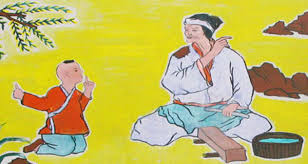磨 mó 杵 chǔ 成 chéng 针 zhēn
English Translation
lit.: an iron rod can be ground into a needle
fig.: perseverance leads to success.
Breaking it down
- 磨: to grind
- 杵: iron rod
- 成: to become
- 针: needle

Source: Google Image Search
Story in Chinese
传说李白小时不爱学习,很贪玩。一天,他逃学到小溪边,看见一位老婆婆手里拿着根铁杵(铁棍),在一块大石头上磨。李白问:“你磨铁作干什么?老婆婆回答:我给女儿磨一根绣花针。”李白又问:“这么粗的铁杵,什么时候才能磨成绣花针呢?”老婆婆说:“只要功夫深,铁杆磨成针”。
李白听后很有感触,回家刻苦用功,终于成为唐代大诗人。
Source: http://chengyu.t086.com/gushi/79.html
Story in English
Legend has it that Li Bai (famous poet from the Tang Dynasty) did not like to learn when he was young, but was rather playful.
One day, he skipped school and went to a streatm, and saw an old woman holding an iron rod in her hand, which she was grinding on a large rock.
Li Bai asked her: "Why are you grinding this iron rod?"
The old woman responded: "I will grind an embroidery needle for my daughter."
Li Bai asked again: "It is such a thick iron rod, when can it ever be ground into an embroidery needle?"
The old woman said: "With time and effort, the iron rod can be ground into a needle."
When Li Bai heard this, he was very moved. He went back home and started to work hard, and in the end became a great poet in the Tang Dynasty.
Translation by Celine Li
Usage
没有磨杵成针的毅力,学问上就不可能有很深的造诣.